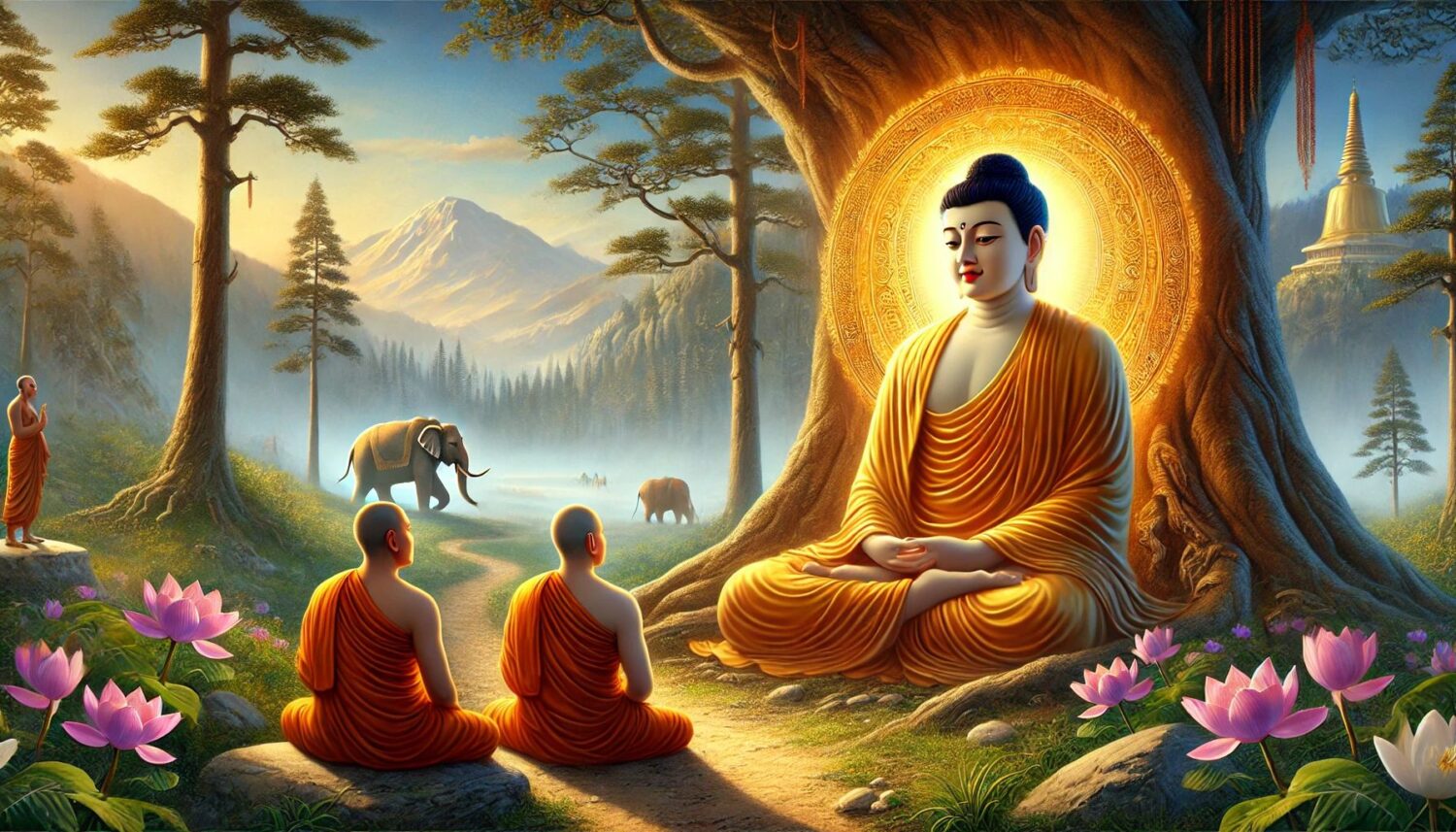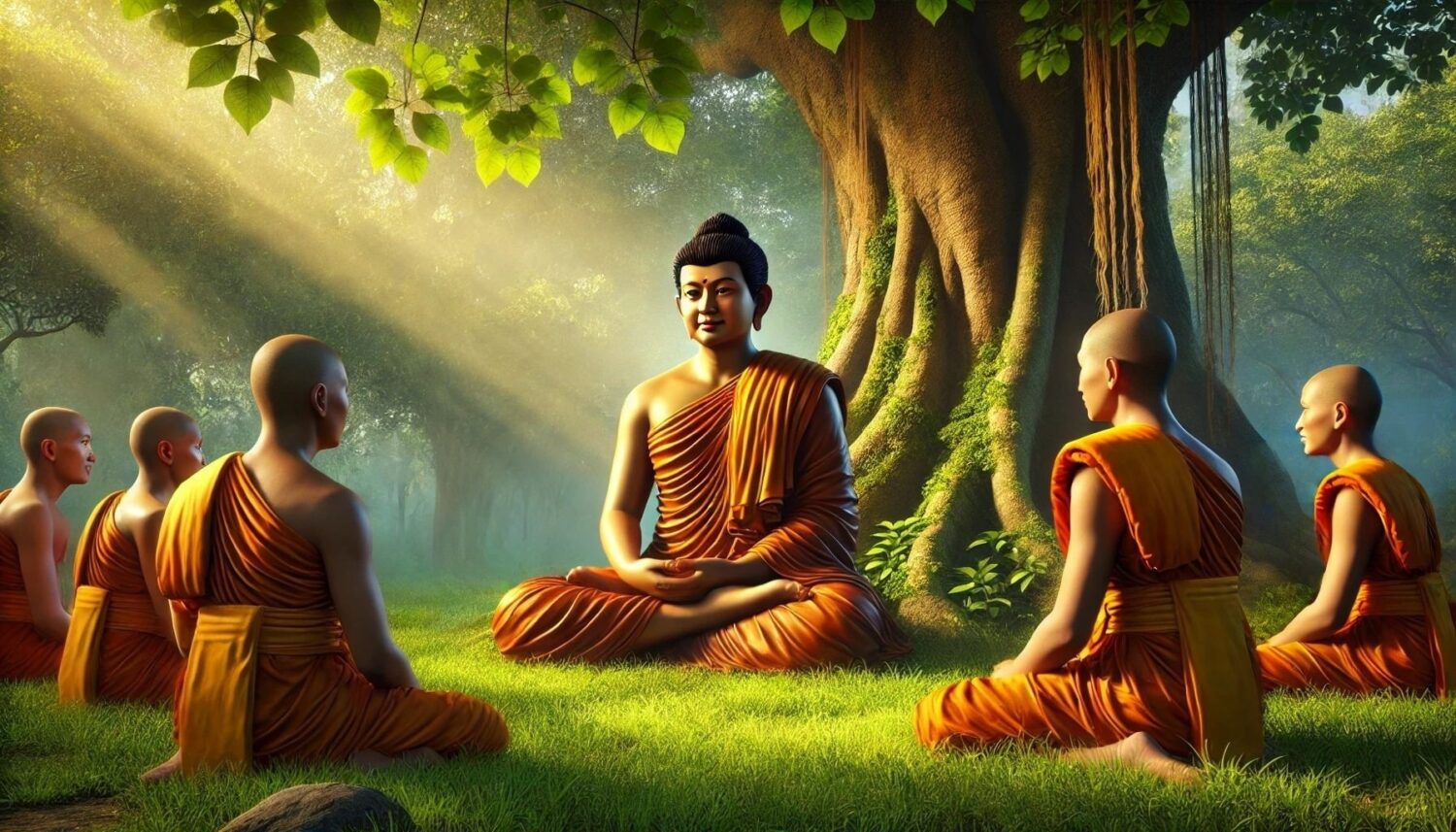
Date: 09/20/2025 09/21/2025
Location: Star Lake Meditation Center
Teacher: Shilin Long
Dharma Talk
The Buddha Speaks on the Former Lives of the Four Monks Who Discussed Pleasure
In the past, the Buddha was dwelling at Jetavana Monastery in the kingdom of Śrāvastī, teaching and guiding sentient beings. One day, four monks who had not long ago gone forth into homelessness agreed to sit in meditation under a jujube tree to cultivate the path.
It happened to be the season when the jujube blossoms were in full bloom, and their delightful fragrance drifted gently in the air, naturally bringing to mind the pleasures of worldly enjoyment. The four began to chat idly, discussing what in the world could be considered the most delightful thing that brings people satisfaction.
One monk, gazing at the scenery before him, smiled and said: “The season of warm spring and blossoming flowers, going on an outing in verdant mountains and open fields — that is the most pleasurable thing.”
Another monk, recalling gatherings with relatives and friends, said: “Being together with loved ones, drinking, while enjoying graceful singing and dancing — that is such joy!”
The third monk said: “If one had abundant gold and silver treasures, fine carriages, horses, and clothing, and whenever one went out, everyone admired them — how wonderful that would be!”
The fourth monk added: “And if one had a lovely wife and beautiful concubines, wearing exquisite garments and fragrant with perfume, indulging freely in the pleasures of love — that would be even greater happiness.”
Thus, the four monks, one after another, enthusiastically spoke of the pleasures of the human world.
The Buddha knew that these four could be liberated, but they were still pulled by worldly desires and had yet to deeply contemplate the truth of impermanence. He summoned them and asked: “What were you discussing so happily just now under the tree?”
The monks honestly reported the conversation.
The Buddha, hearing this, took the opportunity to teach:
“What you were thinking is in fact quite dangerous. It only leads people toward sorrow, fear, peril, and death — it is not a lasting or genuine happiness.
Plants and trees grow and wither as the seasons change; the gatherings of relatives inevitably face times of parting; wealth and fine carriages cannot escape the fate of being lost to flood, fire, government seizure, thieves, or the ruinous behavior of heirs; the beauty of wives and concubines is the very source of the afflictions of love and hate.
Thus, worldly pleasures, though they may appear beautiful, often cause one to fall into wave after wave of affliction, attracting resentment and disaster, and plunging one into the eight difficulties and the three lower realms, with immeasurable suffering.
Therefore, monks, see this truth clearly. Abandon the worldly pursuits of wealth, sensuality, fame, and gain. Go forth and diligently cultivate the path, walking toward the unconditioned peace of Nirvāṇa — that is the greatest joy in life.”
The World-Honored One further encouraged them with these verses:
Affection gives rise to sorrow,
Affection gives rise to fear;
Without affection,
What sorrow? What fear?
Delight gives rise to sorrow,
Delight gives rise to fear;
Without delight,
What sorrow? What fear?
Desire gives rise to sorrow,
Desire gives rise to fear;
Free from desire,
What sorrow? What fear?
Through restraint from desire, virtue is fulfilled,
With sincerity and a sense of shame;
One’s conduct is close to the Path,
And one is loved by all.
With lust not manifest,
With right thought and right speech,
With a mind free of craving and clinging,
One will surely cross the flood to the other shore.
The Buddha then told the four monks:
“In the past there was a king named Pu’an, who was close friends with four neighboring kings. On one occasion, King Pu’an invited these four kings to visit his country. They feasted and enjoyed themselves together for an entire month, drinking wine and indulging in merriment.
On the day of parting, King Pu’an asked the four kings: ‘What is the greatest pleasure in the human world?’
The first king said: ‘It is, of course, our gathering together to play and enjoy ourselves.’
The second king said: ‘I think that during a family banquet, listening to beautiful music is the most delightful.’
The third king said: ‘To have abundant treasures and use them freely is the greatest joy.’
The fourth king said: ‘The pleasures of love between men and women, indulging in sensual passion — that is the most enjoyable thing in the world.’
King Pu’an told them: ‘What you have described are all in fact the roots of suffering, worry, and fear. While pleasures bring joy in the moment, they plant the seeds of greed, anger, and delusion. When the conditions ripen, they will surely bear the fruit of suffering.
It is better to live in simplicity and cultivate the Way, with no craving or desire, guarding this one true mind — this is genuine happiness.’
Hearing this, the four kings all praised his words and accepted them with faith, putting them into practice.”
The Buddha then said to the four newly ordained monks:
“At that time, I was King Pu’an, and those four kings were you four. In a past life, you had already heard this principle, yet in this life you have again fallen into delusion and forgotten it, failing to understand the meaning of worldly suffering and joy.
In this way, turning endlessly in birth and death, when will you have the day of liberation?”
The four monks, hearing the Buddha’s teaching, felt deep shame, sincerely repented, and diligently cultivated. They eradicated false thoughts, cut off all craving, and before long, each attained the fruit of Arhatship.

